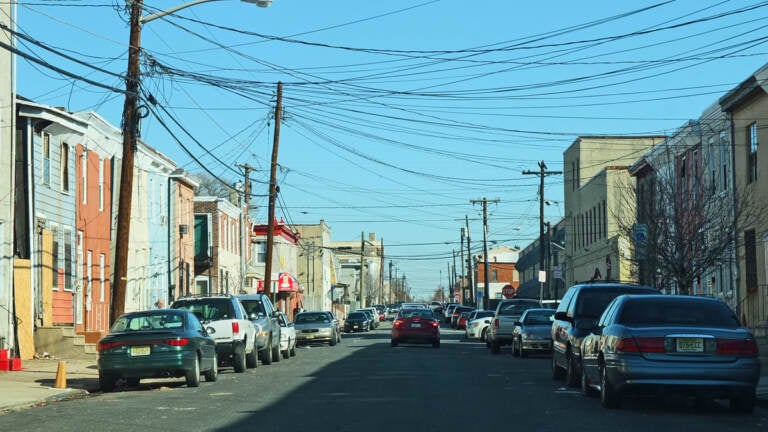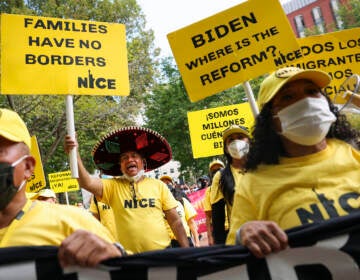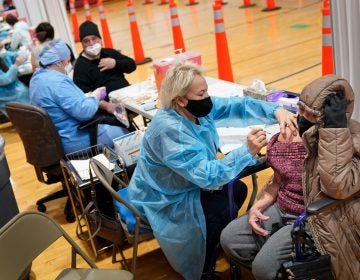Report: N.J. COVID relief fund for excluded workers didn’t go far enough
While a report from New Jersey Policy Perspective said the state did not set aside enough aid, the state argues the program did not see as much demand as expected.

File photo: Camden, New Jersey. (Alan Tu/WHYY)
A New Jersey fund set up to assist undocumented immigrants and other workers who aren’t eligible for other forms of pandemic aid did not go far enough to help those in need, according to a report from New Jersey Policy Perspective released Thursday.
“New Jersey undocumented immigrants have gone almost two years without federal relief or unemployment benefits, despite being among the hardest hit communities by the pandemic,” said NJPP Research Director Nicole Rodriguez, who authored the report.
The Excluded New Jerseyans Fund was established last May by the Murphy administration, which originally earmarked $40 million in federal CARES Act funding to be spent by Dec. 31, 2021.
The state put in an additional $10 million from the federal American Rescue Plan to fund the program through the end of January, but New Jersey Policy Perspective also found the state diverted $34 million from the program and reallocated it to pay for other expenses.
A spokesperson for Gov. Phil Murphy said the state risked losing the CARES Act funds if it didn’t spend the money by that date and it received fewer applications for the Excluded New Jerseyans program than expected.
“The additional funds will go toward eligible state expenses — likely payroll and various department costs incurred due to COVID in the eligible timeframe,” the governor’s office said in a statement.
State residents who suffered a coronavirus-related hardship but were ineligible for federal stimulus payments and unemployment insurance could apply for the program and receive $2,000 per person and up to $4,000 per household. The fund is limited to families making $55,000 or less per year.
Even if the state had not diverted the lion’s share of the funds, the NJPP report said the state would have needed to set aside even more money to help all workers in need. According to a 2019 Pew Research Center report, the Garden State is home to nearly half a million undocumented immigrants. According to the Center for Migration Studies of New York, almost 300,000 undocumented immigrants are part of the workforce.
“If the state were to more equitably provide relief for excluded workers by matching the minimum amount of unemployment insurance received by other New Jersey residents who lost income since the onset of the pandemic, the Excluded New Jerseyans Fund would require $1.4 billion, plus additional funding for outreach and program administration,” the report said.
But the state Department of Human Services, which began accepting applications for the money in October, said the demand for the program is only around $17 million so far.
Johanna Calle, director of DHS’ Office of New Americans, said the agency had received about 12,700 applications and approved more than 3,000. Nearly 1,800 applications are inactive, meaning the applicant “did not respond to a request for information or withdrew their application,” Calle said. The rest of the applications are pending review.
“At this moment, we are unclear whether folks who have applied and been approved have received any federal relief yet,” Rodriguez of NJPP said.
Calle said in a statement benefit payments have gone out to approved applicants “on a weekly basis.” The department hired six community organizations to “review applications, determine eligibility, and provide program outreach.”
Calle said the department tasked the organizations with processing applications and following up with applicants who needed more information to complete the process. DHS provided training, materials, and resources to contracted organizations and met with them often to “support their application review process.”
“It was not accessible … the requirements, the kind of documentation,” said Rosanna Rodriguez, executive director of the Laundry Workers Center, a nonprofit organization that advocates for low-wage laundry, warehouse, and food service workers in New Jersey and New York. “After they filled out the application, the process for evaluation and approval …, it was a difficult process.”
Rosanna Rodriguez said it worked closely with some of the groups hired by the state, including Make The Road New Jersey, but those organizations could not reach everyone. She said many of the people her organization supports are not “tech savvy” and ran into technical issues when filling out the application. She also said state agencies could have done better at outreach in general.

Get daily updates from WHYY News!
WHYY is your source for fact-based, in-depth journalism and information. As a nonprofit organization, we rely on financial support from readers like you. Please give today.




![CoronavirusPandemic_1024x512[1]](https://whyy.org/wp-content/uploads/2020/03/CoronavirusPandemic_1024x5121-300x150.jpg)



